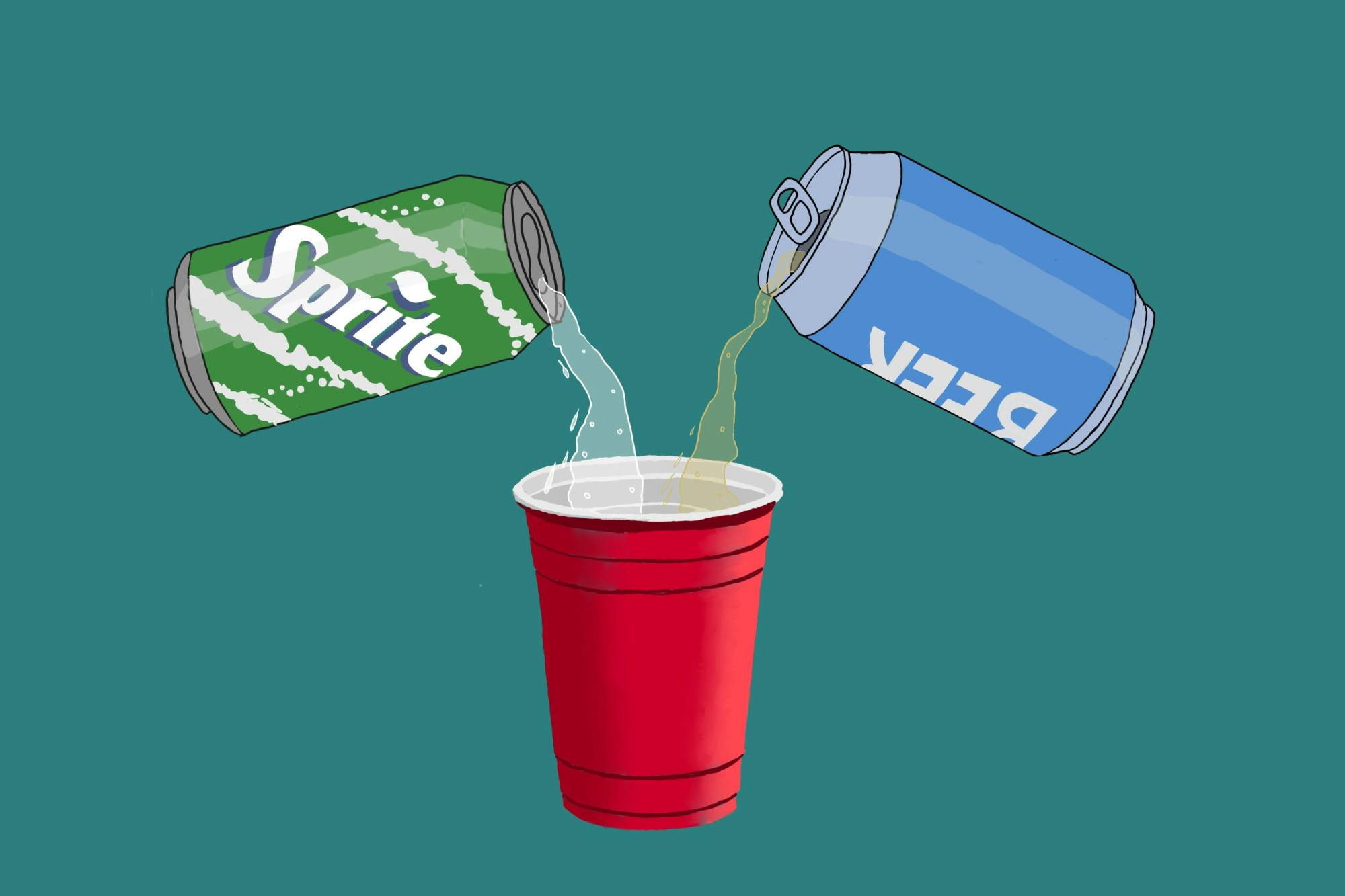There is no typical day in the life of a Dartmouth student — there are too many ways to fill your time. You might choose to take a cool dip in the Connecticut River, spend an afternoon looking through the lens of a microscope or stain your fingers with ink in the Book Arts Studio. Once the sun sets, however, those options decrease.
My conversations with Dartmouth students about alcohol consumption on campus quickly became conversations about “going out” culture. At Dartmouth, “going out” is usually shorthand for spending hours in a Greek house basement, shoulder-to-shoulder with many friends and even more acquaintances. It’s an inherently social experience, Millie Keogh ’25 noted, describing frats as a space to converse, meet new friends and dance. Yet this experience is often inextricably tied to alcohol, so much so that students are surprised to hear about those who participate in the “going out” scene sober.
“I consistently go out, and I consistently don’t drink,” Keogh said. “When I tell people that, they think it’s a lot worse than it is.”
Michael Curry ’25 shared a similar experience with going out sober. “People ask me if I’m going out and I’ll say, ‘Yeah, I’m going out.’ But when I don’t start drinking, they say, ‘wait, you’re not going out?’” Curry said.
Perhaps we can blame the movies, but the college experience has become synonymous with red Solo cups and drunk mistakes. Both are certainly present on campus, and maybe there’s nothing wrong with that, but the degree to which they impact our lives is worth exploration. The Venn diagram of “going out” and binge drinking appears, at times, to be a single circle here at Dartmouth.
There seems to be a common assumption that being in a fraternity basement requires having a Keystone in hand. It’s a belief rooted in a genuine social norm on campus, but a belief that perpetuates the myth that one cannot enjoy Dartmouth social spaces without flirting with alcoholism.
“I made a lot of stupid, goofy mistakes every time I went out when I was drinking, and it was a pattern, which is why I stopped,” shared a member of the Class of ’25, who requested anonymity to speak candidly about her experiences. Being a college kid entitles you to some amount of grace because this time period is intended for growth. Mistakes are an essential part of youth, but it’s challenging to reflect on mistakes and break free from bad habits if everyone around you seems to have the same ones.
Going out on a college campus leaves room for error. There is an expectation that nobody is looking at you, or that there’s no need to look after yourself. “I think I understand Dartmouth culture better when I watch interactions happen [while sober] on a night out, because you're not really supposed to watch these things,” Loane Bouguennec ’25 said.
Despite a variety of social spaces and dry events, campus culture can make it seem like drinking is nonnegotiable. Achla Gandhi ’25 said she believes that this is not the case. “Drinking is not inevitable. Sobriety is doable,” she said.
Gandhi is not in the minority. Brian Bowden of the Student Wellness Center shared that 77% of Dartmouth students did not disclose a binge drinking episode in the Dartmouth Health Survey from 2020. “When we are out socializing we only notice the louder moments that exaggerate the use, and so it appears as though more people are drinking in that manner,” Bowden said.
Perceived norms around drinking at Dartmouth, those that prompted Bouguennec to call drinking “fundamental” to Dartmouth culture, are not without foundation. The routine presence of alcohol, up to the point of a stranger placing it in your hand without question, is enough pressure to drink more without even considering the expectations of peers. “It’s hard not to feel boring,” Keogh said, echoing sentiments from other interviewees who mentioned that they feel like they have to drink to seem “fun.”
Sobriety, by definition, is the state of mind of someone not currently intoxicated, but on a small college campus, it can feel like an identity factor. There’s pressure to justify one’s sobriety with the right reason, whether it’s a long-term life change, a religious belief or an unlikely decision at a particular event. Bouguennec put it succinctly when she described how other people can have a strong influence on one’s choice on whether to drink or not: “There’s almost too many stakeholders, and it should be just you.”
Dartmouth’s social bubble and the external pressure to make the most of our time within it can make it easy to forget that our relationships to substances now are going to affect the relationships we have with them moving forward. As young adults, we have the ability to be intentional about what we want our future to look like, and reflect on whether we are on the path to reach that ideal — one that nobody else can choose for us.




